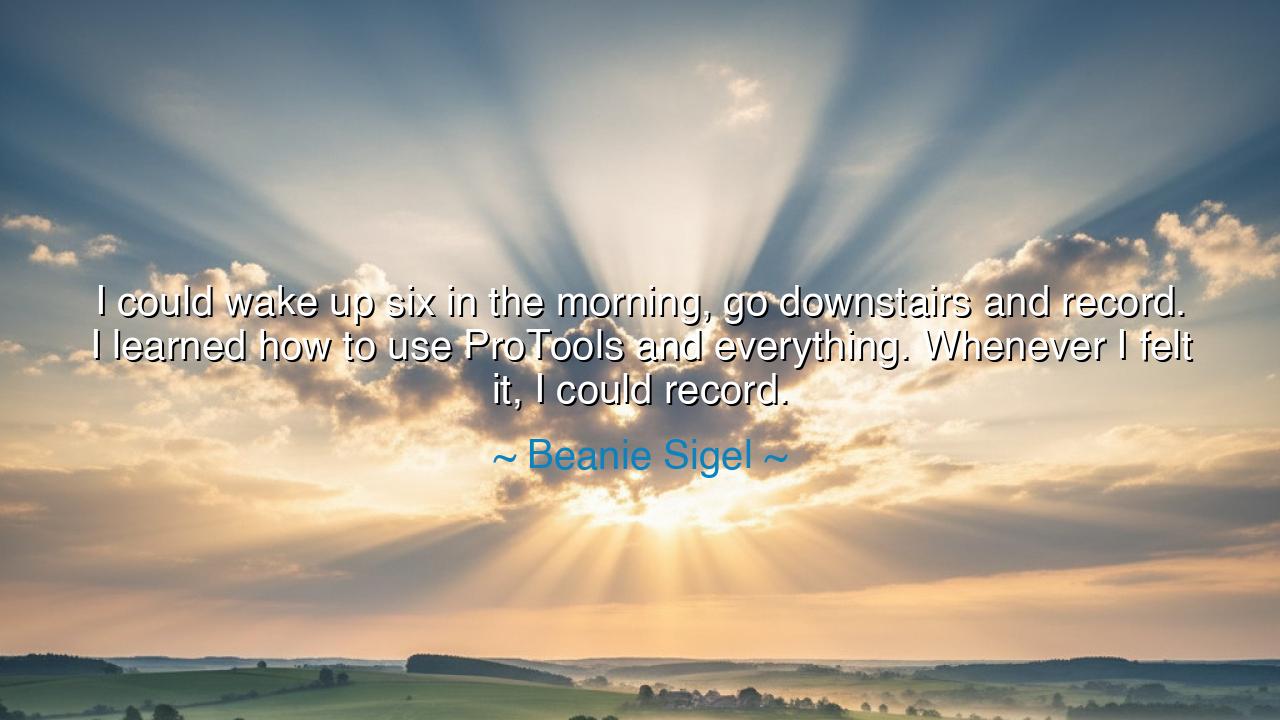
I could wake up six in the morning, go downstairs and record. I
I could wake up six in the morning, go downstairs and record. I learned how to use ProTools and everything. Whenever I felt it, I could record.






From the voice of Beanie Sigel, forged in struggle and sharpened by artistry, we are given this testimony of devotion: “I could wake up six in the morning, go downstairs and record. I learned how to use ProTools and everything. Whenever I felt it, I could record.” At first, these words seem the simple recollection of an artist describing his craft. Yet beneath them flows a deeper current of wisdom: the discipline of labor, the hunger for mastery, and the sacred freedom of expression that comes when one removes all barriers between inspiration and action.
When he says, “wake up six in the morning, go downstairs and record,” he paints a picture of constancy. For greatness is not found in a single burst of genius, but in the daily return to the work, again and again, at hours when the world still slumbers. It is the discipline of the dawn, the willingness to trade comfort for creation. In these words we hear the same spirit that drove farmers to till their fields before sunrise and monks to rise for prayer in the cold hours of night. To commit oneself at six in the morning is to declare: my craft is not a pastime, but a calling.
The mention of ProTools carries its own wisdom. Sigel did not rely only on others to capture his vision—he humbled himself to learn the tools of his trade. The ancients praised the craftsman who not only imagined but shaped with his own hands: the potter who knew his clay, the blacksmith who knew his forge. By learning ProTools, Sigel became both poet and builder, master of his voice and of the vessel that carried it. This is a lesson to all: do not wait for others to shape your vision. Learn the tools. Master them. Then your art, your work, your dream is yours alone to command.
He says, “Whenever I felt it, I could record.” Here lies the essence of artistic freedom. Inspiration is fleeting, like a flame that flickers for a moment before vanishing. To capture it, one must be ready at any hour. Sigel’s preparation allowed him to turn feeling into sound the very instant it stirred in his chest. History tells us the same of Beethoven, who carried notebooks everywhere to capture melodies before they escaped. Those who are truly devoted build a life where inspiration need not wait, but finds them always ready to receive it.
This story is not about music alone; it is about readiness in all things. Consider Alexander the Great, who slept with a dagger and a copy of Homer’s Iliad beside him. Why? Because he knew that opportunity, like inspiration, may arrive unannounced. To be unprepared is to lose the moment forever. Just as Beanie Sigel built his studio downstairs to seize inspiration, so must each of us prepare ourselves—whether in skill, discipline, or courage—so that when our moment comes, we do not falter.
The lesson shines clear: discipline creates freedom. By rising early, by mastering the tools, by preparing the space, Sigel gave himself the freedom to create whenever the spirit moved him. Without such discipline, the moment of inspiration would be lost. Thus we see that freedom is not the absence of structure—it is the reward of preparation. Those who would live fully must first labor faithfully, setting their house in order so that when inspiration knocks, it may enter unimpeded.
Practically, let us learn from this: establish your space of creation. Learn the tools of your craft, even if the learning is hard. Create habits that allow you to act the moment you feel moved, whether that means rising early, keeping instruments at hand, or building routines that guard your focus. Do not wait for the perfect time, for perfection never comes; prepare yourself so that whenever you feel it, you may act.
Thus, Beanie Sigel’s words, simple in telling, resound as a teaching: make yourself ready, through discipline and mastery, to give form to inspiration the moment it appears. For those who wait unprepared, inspiration will pass them by; but those who labor, who rise early, who learn and who prepare, will turn fleeting sparks into fire everlasting.






AAdministratorAdministrator
Welcome, honored guests. Please leave a comment, we will respond soon